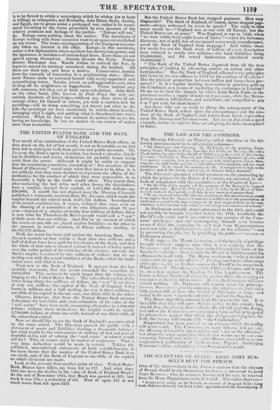THE UNITED STATES BANK AND THE BANK OF ENGLAND.
Tim result of an examination of the United States Bank affairs. as they stood on the 1st of last month, is not so favourable as we had been led to anticipate both from private and public accounts. Mr. Jaunms, the Bank's agent in London, has issued a circular, detail- ing its liabilities and assets, deductions for probable losses being made from the assets. Although it might be unfitir to suppose that the examining committee, consisting of " five members of the Board of Directors," would state what they know to be thlse, it is not unlikely that they were desirous to represent the affairs of the institution, for the conduct of which they were responsible, in as fitvourable a light as the truth would allow. They report that, after deducting the bad debts and other losses, the shareholders have a surplus, beyond their capital, of 1,071,004 dollars—say 220,000/. A month has not elapsed since the Morning Chronicle published a statement, received from Mr. JAUDON, which made the surplus beyond the capital stock 3,871,724 dollars. Investigation of its actual condition has, it seems, reduced that sum, even on the showing of a committee of its own Directors, about 75 per cent.—instead of a surplus of nearly four millions of dollars, there is now what the Threadneedle Street people would call a " rest" of little more than one million. And this on an account of which the assets on one side are placed against liabilities on the other to the amount, in round numbers, of fifteen millions sterling, or 66.576,776 dollars. Well, the worst has been said against the American Bank. Mr. JAUDON reminds us that within a short time two millions and a half of dollars have been paid for the charter of' the Bank, and that the whole of that sum is charged against it, instead of being spread over the entire period of the existence of the charter ;1
wocreby the .Bank's surplus is reduced by two millions of dollars : but we are dealing now with the actual condition of the Bank—what the insti- tution owes and what it has.
Turn DOW to the Bank of England. It appears from the last monthly statement, that the assets exceeded the securities by 8,051,000/. This seems to he much larger than the balance be- longing to the United States Bank. The subscribed capital of the latter being thirty-five millions of dollars, the " rest" is set down at only one million : the capital of the Bank of England being fourteen millions and a half sterling, the rest is three millions,— one-fifth of the capital in the one case, one thirty-fifth in the other. Observe, however, that from the United States Bank account deductions for bad debts and over-estimation of the value of the " real estate' have been made, amounting altogether to 4,C00,000 dollars : without these deductions, the surplus \\amid be nearly 5,700,000 dollars, or about one-sixth, instead of one thirty-tifth, of the subscribed capital. Now we should like to see the Bank of England's accounts tried by the same ordeal. The Directors present the public with a statement of assets and liabilities showing a thyourable balance ; but what would be the consequence of striking oil' bad and part of doubttUl debts, and of valuing the " real estate" at what it would sell for ? This of course, must be matter of conjecture. That a very large deduction would be made is certain. Taking the exhibited, unscrutinized statements of both establishments, it has been shown that the surplus of the United States Bank is as one-sixth, and of the Bank of England as one-tifth, of the capital on which dividends are made.
Look at the account from another point of view. United States Bank Shares have fallen, say from 21/. to 17/. And what since 1834 has been the decline in the value of Bank of England Stock ? At the end of November 1834, that Stock was quoted at 223; last week it was 178,—a reduction of 45/. Now 4/. upon 21/. is not much worse than 45/. upon 223/. But the United States Bank has stopped payment. How very disgraceful! The Bank of England, of course, never stopped pay.
.ment—always redeemed its notes in specie? The reply to this taunt would be—" England was at war with all Europe, but the
United States are at peace." Was England at war in 1826, when "we were within forty-eight hours of barter "—when the fortunate. discovery, not of gold, but of one-pound notes ready manufactured,
saved the Bank of England from stoppage? And within these few weeks has not the Bank stock of bullion of every description been reduced to nearly two millions—the total liabilities being 23,000,000/., and the actual bank-notes circulated nearly 18,000,0001.?
" The Bank of the United States departed from all the true principles of banking by advancing monies on cotton and other merchandise." Has the Bank of England adhered to the principles
laid down by its own officers in 1833 for the conduct of its anise ? Has the prudent proportion between bullion and issues been pre-
served ? Is it a regular banking transaction to purchase gold on the Continent as a means of regulating the exchanges in London? Or are we to laud the bargain by which Joint Stock Banks in the
provinces receive a supply of notes at 3 per cent., while the Metro- politan bankers, bill-brokers, and merchants, are compelled to pay 6 or 7 per cent. for short loans?
Let those who are so ready to blame the management of the United States Bank, reflect upon the circumstances and the con- duct of the Bank of England, and refrain from harsh reproaches upon Mr. Biome and his successors. Let us set Jonathan a good example, before we reprove him, our offspring, for faults he acquired at home.


























 Previous page
Previous page